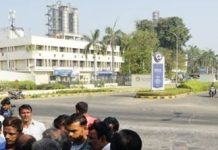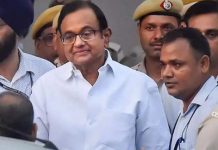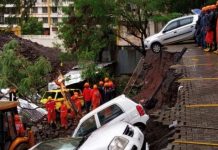 As I see today’s politicians running from here to there, screaming and shouting the typical, that vital connect factor seems amiss. Yes, gone are those days when every single word or sentence uttered by the politician was grasped by the masses, without doubts or queries or counter queries. And yes, even film stars in the political fray were not just accepted but respected, because they were earnest and actually and genuinely wanted to reach out to the people of this country.
As I see today’s politicians running from here to there, screaming and shouting the typical, that vital connect factor seems amiss. Yes, gone are those days when every single word or sentence uttered by the politician was grasped by the masses, without doubts or queries or counter queries. And yes, even film stars in the political fray were not just accepted but respected, because they were earnest and actually and genuinely wanted to reach out to the people of this country.
In fact, one such actor-politician was Sunil Dutt. A man with such a personality and vision. And as his ninetieth birthday nears — he was born on 6 June 1929, in Dina, in the Undivided Punjab (now in Pakistan) — I’m more than reminded of him. I had met Sunil Dutt more than once. As far as I can recollect on four different occasions. All here, in New Delhi. And much after he had joined active politics.
My very first meeting with him was in the 90s. In fact, let me write details to it, together with the detailed interview with him. Nah, it wasn’t easy to get an appointment. Had continued calling his office. Each time I was told that through the week he’d be preoccupied with work and on weekends he travels to Mumbai.
Finally, when the appointment came through, I’d reached his official bungalow on New Delhi’s Safdarjung Lane. The drawing room, where I was made to sit, was equipped with just the bare basics. Nothing very much in that room except a wall full of photographs — 33 framed photographs.
Sunil Dutt with Nargis and with their children and grandchildren, with the three generation of the Gandhi family, with Mother Teresa, with President Reagan, with Jimmy Carter, with jawans at the border areas. Then, there were photographs of Nargis receiving various awards and also a photograph of Rekha at the Dutt’s Mumbai home.
And if you readers are wondering how on earth I found ample time to sit and count those photograph and to go into such detailing, I have to offload this — though the appointment for the interview was fixed for 11.30am but Dutt sahib hadn’t returned from Parliament, and with that I had little choice but to wait.
In between that long wait, his P.A., one Mr Sharma, continued conversing, in between quipping: “Dutt sahib has given us strict instructions that we, the staff, have to be very kind to cancer patients, drug addicts and to journalists!”
And after an hour Dutt sahib did arrive and did detail reasons for the delay “Parliament mein tha…” Then half-way through the interview, Raj Babbar had dropped in. And he didn’t sit all quiet but tried becoming a part and parcel of the interview …till, of course, ample hints were relayed by Dutt sahib, that he was more than intruding in that interview and with that he took leave.
And with that I could complete the interview with Dutt sahib, where he commented on the various aspects confronting him. My very first query was: Have you recovered from the trauma of your son Sanjay getting arrested and imprisoned for 19 days under TADA? Why do you think TADA charges were slapped against Sanjay, though your lawyers said it was an arms offence case?
And I still recall he’d looked straight ahead and without much pause had said, “It’s been extremely shocking for us and I don’t think we’ll be able to ever recover from it ….It can’t ever be washed away from our minds. At times, I keep thinking that this is what we have got in return for all that we did for the country. You go punishing a person who is yet to be proved guilty and whose family did whatever possible for the Motherland ….What else to say! I shouldn’t say anything more about all this, at this stage, for the case is going on at the Bombay High Court. Also, any comments made by me can be played up by some other vested interests…”
I’d furthered the interview and asked him to comment on the theory doing the rounds — that is, Dutt sahib was hounded and harassed because he had shown sympathy towards a particular minority community during the Mumbai riots?
Not really refuting the theory, he’d added, “Why this propaganda that I’ve worked only for the Muslims! Earlier when I had undertaken the padyatra from Mumbai to Amritsar then I suppose it was for no Muslim cause! It was only for the Hindus and Sikhs. Even in these Bombay riots, I helped whoever was suffering and affected. Obviously, I couldn’t have first asked their religion and then got down to helping them! I have always and always helped anybody in pain, in need and anybody who is suffering. Though I have myself been a victim of the Partition and with that suffered, but my mother taught us never to hate a human being. I have been brought up on these values and I have passed on these values to my children.”
Shifting focus back on Sanjay’s arrest, Dutt sahib had told me, “My son has changed after all this …I think he will never be the same ever again. In these riots, he’d really worked in trying to provide every possible assistance to the riot victims but now he says to me, ‘Papa I will never do any social work.’ See how sad it is …Don’t want to comment too much on the case at this stage but I am of the belief that if he has committed a mistake then the law should take its own course. But don’t come up with filthy allegations against us. Allegations that I can’t even dream of …people calling us Pakistani agents and Desh Drohis! You can imagine how I felt. Those days wherever I used to go, even the peons at the lawyers’ chambers said right there on my face — ‘desh drohi aa raha hai.’ In fact, once my daughters had gone out shopping and told me the moment they’d stepped into a shop there was a minute’s silence and the rest of the shoppers started walking out of that shop …Can you imagine even my dead wife was dragged into all this! I could hear people say that Sanjay’s mother was a Muslim. I told these people that you can slash Sanjo and me as much as you like but at least spare the dead; or remember Nargis for the work she did for the spastics, for the blind …Nargis worked for all possible people and didn’t work from any religious angle ….Look what all we did for the country. During the two wars, we went to the border areas to meet the jawans and those days, around 1962, when we were financially hard up I’d donated
1 lakh for PM’s relief fund…I am ready to go anything for the country.”
And when I had asked him how he’d dealt with that crisis phase when allegations were heaped on him and his family, he told me — “I told myself that time alone will show and tell them the truth. Also, where did I have the time to prove our innocence. During that crisis, I had been sleeping barely two hours every night. I would get up by 4 am and be out by 5 am, to meet the lawyers …In fact, when my home was being searched by the police for full two days I wasn’t even there, at home …they’d conducted all those searches in my absence.”
He had also detailed that after Sanjay was arrested, he had “approached and met everybody possible yet it took 19 days for Sanjay to be released …Only few friends stood by us during that crisis. From the Congress, it was VC Shukla, Rajesh Pilot, Pranab Mukherjee, Arjun Singh and Jagdish Tytler. From the BJP it was Shatrughan Sinha and Jaswant Singh. From the Janata Party it was Sharad Yadav. And, yes, Chandra Shekharji had also called. And from the film industry it was Dilip Kumar, Rajendra Kumar, Pran sahab and also few members from the South India Film Chambers…”
He had looked upset sand pained as he recounted that he did not get the expected support from Bollywood “Only about three or four friends in the film industry stood by us… The rest had labelled my son Sanjo guilty…yes, labelled him guilty even before the courts did so!”
I had also asked him, suppose he was not a MP and not so well-connected and also from the minority community, then what more hurdles could have come his way? “But even in our case people did not spare us the trauma of coming up with allegations. All sorts of allegations — that Sanju’s mom was a Muslim ….But, then, there are some secular forces in the country which can stop this decay. In Bombay, it was them secular forces which saved the ongoing disaster.”
Was he frustrated the way the political system was functioning — in fact, he had even threatened to resign when the Mumbai riots were peaking? “Yes, I was feeling terrible, for even though I was / I am an elected Member I couldn’t do much for my constituency people …I had entered politics to serve people and yet felt so helpless …Political tamashas taking place …all that reflects the decay in our society. Politicians don’t come from outside. They are part of the society.”
And when I asked him about his friends in the political circles, he was rather diplomatic. “I have no enemies; with that all are my friends. In fact, I have no best friend, as I am myself my best friend! Also, I do I believe that nobody is your enemy except your own destiny ….Yes, my destiny has been rather tough on me …tapairai khai hain zamanai kei …But I suppose one has to fight on, to go on with life …Right from my childhood it has been a struggle but what happened to my son I couldn’t ever even dreamt of …But these are tests of life.”
I’d ended the interview by asking him if there was any solution to the ongoing strife? “Yes, there can be a solution. Only last night I was going through Time magazine and the horror photographs of the war-ridden Somalia shocked me so much that I couldn’t eat. It was dinner time but couldn’t touch a morsel. Just couldn’t …Those horrifying pictures of human beings dying, sitting injured and ill, crawling about, rendered so frail and weak that couldn’t even walk. These human disasters because of the ongoing civil strife in Somalia…. And now I am going to suggest that those pictures be displayed all public places. And displaced with this caption: See what internal war or strife or unrest can do to you, to your country, to your fellow countrymen.”
letters@tehelka.com












